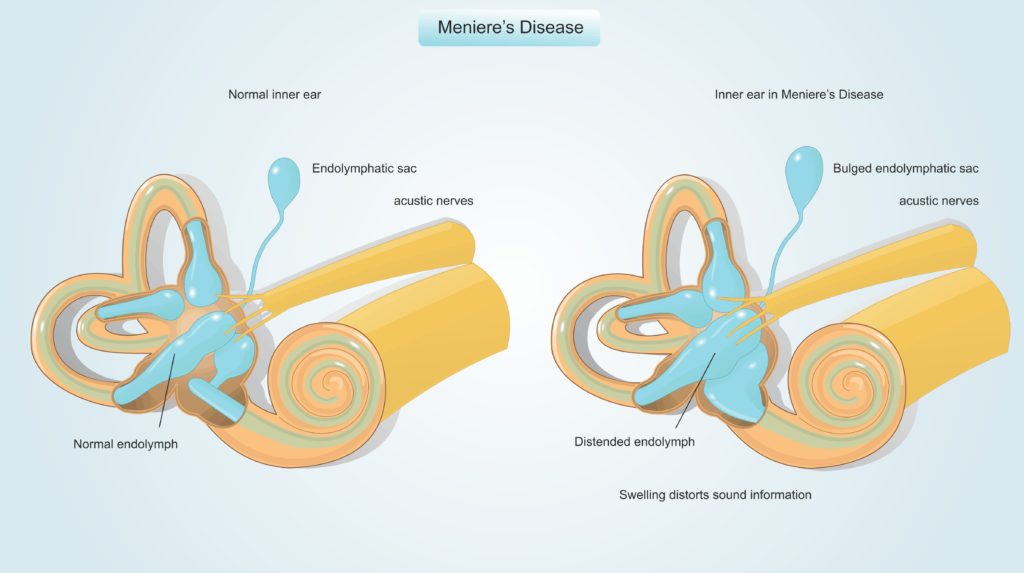Ménière’s disease is a chronic inner ear disorder of unknown origin that is characterised by symptoms that include episodes of vertigo (severe dizziness). Here we explain how Ménière’s is diagnosed and describe some of the treatments that can be used to combat its symptoms.
What is Ménière’s disease?
Ménière’s disease is named after the French doctor, Prosper Ménière, who first identified it in 1861 by relating the dizziness and vertigo it causes with the inner ear, debunking the widely accepted theory that they were due to a form of cerebral apoplexy or epilepsy. He also described the symptom triad that characterises it:
- Vertigo: a sensation of dizziness, as if the room is spinning. In many cases, it is accompanied by other symptoms such as nausea, sweating and nystagmus (abnormal or jerking involuntary eye movements that affect vision) and a loss of balance.
- Tinnitus: the perception of sounds that are not emitted from an external source.
- Hearing loss: varying levels of hearing loss can affect one ear (unilateral), or both (bilateral hearing loss). Although this hearing loss fluctuates, it is also progressive.
In the majority of cases, Ménière’s disease is treated as a unilateral disorder, and is characterised by severe dizziness or vertigo. In Spain, 3 in every 1,000 people suffer from Ménière’s disease, and it is most common in adults aged between 40 and 60.
While its causes remain unknown, we do know that it is produced by the dilation of the membranous labyrinth (endolymphatic hydrops) associated with an increase in endolymphatic fluid, which affects the structures responsible for hearing and balance. Anatomical, genetic, immunological, viral or vascular factors may contribute to Ménière’s disease.

Photo credit: hearingsources
Symptoms of Ménière’s disease
The seven main symptoms of Ménière’s disease are:
- Vertigo
- Hearing loss
- Tinnitus
- The sensation of a full or blocked ear
- Nausea
- Sweating
- Vomiting

The symptoms of Ménière’s disease are intermittent and unpredictable. When they are active, the dizzy spells and episodes of vertigo can last from 5-20 minutes to up to 24 hours. Throughout the course of the disease, hearing can spontaneously improve or worsen, but the patient inevitably loses part of their hearing over time.
Diagnosing and treating Ménière’s disease
There is no specific test or treatment for Ménière’s disease. However, a diagnosis can be made by an ENT specialist, who will carry out several medical examinations such as an ear examination (otoscopy), vestibular testing, image testing such as an X-ray or CT scan, or hearing tests.
The specialist may also carry out a neurological assessment and an MRI scan to rule out vertigo triggers such as an acoustic neuroma (a non-cancerous tumour), or others such as the caloric test (which produces a sensation of vertigo) and rotary chair testing.
Treating Ménière’s disease involves the patient making several lifestyle changes, such as cutting down their consumption of salt, caffeine, alcohol and nicotine. In more severe cases of tinnitus and hearing loss, hearing aids can be used to improve their quality of life.

A positive attitude, relaxation techniques and a healthy diet can help people to cope with their symptoms and learn to live with them in order to reduce their levels of anxiety during future attacks of vertigo.
According to the experts at Clínica Universidad de Navarra, people who suffer Ménière’s disease should eat a low-salt diet and eliminate the fluid that accumulates in the inner ear. If this does not work, a medical solution must be sought to help control the attacks: anti-vertigo medication such as betahistine, antiemetics and diuretics, calcium channel blockers or trimetazidine (an anti-ischemic drug that improves symptoms).
Finally, in a bid to make life easier for people who suffer Ménière’s in Spain, a group of otoneurologists have developed the Meniere app for ASMES (Ménière’s Disease Association Spain), which allows patients to track their symptoms daily, create reports to help them follow the evolution of the disorder, share data and access resources to better understand the condition.

If you detect any symptoms of Ménière’s disease, visit an otoneurologist or ENT professional that specialises in vertigo to confirm if you may be suffering from this chronic disorder.
Post a comment below if you would like to know more about diseases and disorders that can affect the ears and hearing.

Untreated diabetes will cause weight loss. If you are treated with insulin, then eating too much still causes weight gain if you eat too much. You may not be as aware of eating too much as you’re injecting the suitable amount of insulin and many patients may inject too much insulin so they have to eat a little more in snacks. Some diabetics gain weight but only because they are eating more than they should.
I found this article very interesting, thanks for sharing
Thank you so much for your nice words! 🙂